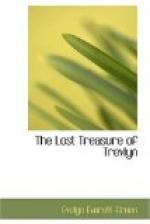“For London, sir. I have an uncle there whom I am about to seek. But the way is something strange to me when the heath be passed, and I know not if I can find it in the dark.”
“I also am bound for London,” answered the stranger, “and in these days it is better to travel two than one, and four than two. But being no more than two, we must e’en hope for the best if we fall not in with other belated travellers. My business brooked not delay; wherefore I came alone. I mislike the fetter of a retinue of servants, and I have had wonderful good hap on the roads; but there be others who tell a different tale, and I often join company when I find a traveller to my liking going my way.”
Cuthbert was glad enough to have a companion. This man was many years his senior, so that he was somewhat flattered by the proposition of riding in his company; moreover, he was plainly a gentleman of some condition, whose fancy it was (not his necessity) to travel thus unattended. Also he was speedily conscious of a strange sense of fascination which this stranger exercised upon him, for which he could not in the least account; and he quickly found himself answering the questions carelessly addressed to him with a freedom that surprised himself; for why should there be such pleasure in talking of himself and his prospects to one whose name he did not even know?
When first he had pronounced his name, he observed that the stranger gave him a quick, keen glance; and after they had been some time in conversation, he spoke with a sudden gravity and earnestness that was decidedly impressive.
“Young man, I trust that you are loyal and true to the faith of those forefathers of yours who have been one of England’s brightest ornaments. In these latter days there has been a falling away. Men have let slip the ancient truths. Love of the world has been stronger within them than love of the truth. They have let themselves be corrupted by heresy; they have lost their first love. I trust it is not so with you. I trust you are one of the faithful who are yet looking for brighter days for England, when she shall be gathered again to the arms of the true Church. But a few minutes ago I saw you make the holy sign, and my heart went out to you as to a brother. These Protestants deny and contemn that symbol, as they despise and contemn in their wantonness the ordinances of God and the authority of His Vicar. I trust you have not fallen into like error; I trust that you are a true son of the old stock of Trevlyn?”
“I know little of such disputed matters,” answered Cuthbert, made a little nervous by the ardent glance bent upon him from the bright eyes of the speaker. He had a dark, narrow face, pale and eager, a small, pointed beard trimmed after the fashion of the times, and the wide-brimmed sugar-loaf hat drawn down upon his brows cast a deep shadow over his features. But his voice was peculiarly melodious and persuasive, and there was a nameless attraction about him that Cuthbert was quick to feel. Others in the days to follow felt it to their own undoing, but of that the lad knew nothing. He only wished to retain the good opinion this stranger seemed to have formed of him.




